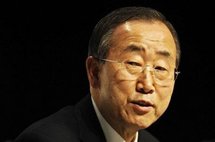Eyes of the world are on you, UN chief tells climate summit
Chris Otton
COPENHAGEN, Chris Otton - UN chief Ban Ki-moon urged world leaders Tuesday at a "defining moment in history" to put aside selfish national interest and answer a global clamour to halt the juggernaut of climate change.
With just over three days left to broker one of the most ambitious, yet also fiendishly complex, deals in human history, conference chair Denmark appealed for all sides to embrace the spirit of compromise.

UN chief Ban Ki-moon (AFP/Olivier Morin)
The summit aims at sealing national pledges to curb the heat-trapping carbon gases wreaking havoc with Earth's climate system, and set up a mechanism to provide billions of dollars for poor countries facing worsening drought, flood, storms and rising seas.
Crowned on Friday by a meeting of some 120 heads of state and government, the outline political deal would be fleshed out next year in further talks, culminating in a treaty that would take effect from 2013.
But former US vice president and environmental activist Al Gore, voicing widely held fears that Copenhagen might yield only a partial success, called for world leaders to meet in Mexico City in July to complete the process.
Ban, speaking at the formal start of the full ministerial session known as the high level segment, spoke of a "defining moment in history.
"We know what we must do. We know what the world expects. Our job here and now is to seal the deal, a deal in our common interest."
Talks were moving too slowly, he warned.
"If they want to leave all these issues to the leaders, it may be very difficult for them to agree in just one or two days," he later told reporters.
The talks' chairwoman, Denmark's Connie Hedegaard, said success was still within reach.
But she added: "We can't risk failure. No one here can carry that responsibility. That means that the keyword for the next two days must be compromise."
But both China and the United States appeared in little mood to move on the key issue of emissions.
US President Barack Obama has offered to cut US carbon emissions by 17 percent by 2020 over a 2005 benchmark, a figure that aligns with legislation put before the US Congress.
The offer by the United States, the world's second biggest polluter after China, has been widely criticised by other parties as inadequate.
"I am not anticipating any change in the mitigation commitment," said US chief delegate Todd Stern, explaining that it was tied to legislation currently before Congress.
Beijing's climate ambassador said China's voluntary plan for braking the forecast growth in its emissions was not open to negotiation.
"We announced those targets, we don't intend to put them up for discussion," Yu Qingtai told reporters.
Europe, which has already pledged to reduce emissions by 20 percent by 2020 in comparison with 1990 and offered to go to 30 percent if others follow suit, said the big polluters had to relent.
"There are two countries in the world representing half the emissions of the world, and that's the United States and China," said Swedish Environment Minister Andreas Carlgren, representing the 27-nation European Union.
European powerhouse Germany likewise pointed the finger.
"Both want to keep every option open up to the last hours of the conference ... We don't have much time left," said its environment minister Norbert Roettgen.
The European Union's new president Herman Van Rompuy also urged other nations to follow Europe's lead, telling reporters in Lisbon, "We have to deal with other urgent questions. The most important of course is climate change."
EU leaders last week agreed a package of 7.2 billion euros (10.6 billion dollars) in aid to help developing countries tackle global warming.
But the Group of 77 developing nations -- actually a caucus of 130 states that includes China -- said the proposal failed to address the issue of setting up long-term financing mechanisms.
In Copenhagen meanwhile, reflecting deadlock, a new draft text gave no figures for a long-term goal of reducing greenhouse-gas emissions, a peak for emissions, an intended limit to warming, nor on financing for poor countries exposed to climate change.
These core questions were farmed out to small parties of ministers, charged with brokering a consensus by Friday.
The summit is billed as one of the most important gatherings of the post-World War II era.
-----------------------------------------------------------------------------------------------------------------------------